
Vol. 1, No. 16 Published by India China Division, Air Transport Command May 3, 1945
|
MEDICS FIGHT CHOLERA
AS EPIDEMIC SPREADS
IN CALCUTTA VICINITY ?
Surgeons Issue Warnings to
Soldiers Visiting Calcutta
Hq., Calcutta - Surgeons of the various commands have conferred here in the past week to determine means of protecting military personnel from a cholera epidemic currently raging in the Calcutta area.
Up to now, deaths from cholera are claiming approximately 100 persons per day in Calcutta. No soldiers are reported to have been afflicted. The negative casualty figure among the military is due largely to the prompt action and close vigilance with which medics are countering the disease.
Beverages A Source
Considering it impractical to declare the city out-of-bounds, the surgeons have issued warnings against eating and drinking in places other than Army installations.
General plans laid at the meetings also call for an intensified immunization program.
Source of infection of cholera is food and beverages. Since there is no absolute assurance that the vaccine administered to Army personnel will provide 100 percent immunity, consumption of only properly prepared and protected foods and beverages is the sole positive safeguard against contraction of the disease.
Personnel Immunized
As pointed out by Calcutta newspapers, foodstuffs for sale at even reputable establishments are of questionable cleanliness, and Army messes alone are recommended by the medics.
At bases near Calcutta all military personnel are being immunized unless they have received the vaccine within the past two months. Personnel visiting this area also will be immunized against cholera if they haven't been administered the vaccine in the past two months.
Emphasizing the seriousness of the disease, Col. Edward A. Abbey, division surgeon, points out that the period between diagnosis of the disease and a fatal outcome can be as little as six to eight hours.
New Regulations Tighten Rules on Oxygen Use
Requires It at 3,000 Feet in Daytime, 1,500 at Night
Hq., Calcutta - ICD flight crews on daylight Hump missions now are required to use oxygen above 3,000 feet, according to a recent division regulation. During night, flight crews will use oxygen upon reaching 1,500 feet above runway elevation and will continue to use it until entering the traffic pattern at destination.
Unexplained Accidents
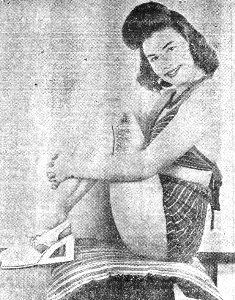 GIs at 1306, Karachi who were given a pre-publication look at the above photo came up with the verdict: "Stateside,
Prime," but they were wrong. The luscious lassie is a Polish refugee yelept Irene and is the
fianc e of a GI
at this base.
GIs at 1306, Karachi who were given a pre-publication look at the above photo came up with the verdict: "Stateside,
Prime," but they were wrong. The luscious lassie is a Polish refugee yelept Irene and is the
fianc e of a GI
at this base.
|
These new rules for the use of oxygen have resulted from a vigorous program to reduce the hazards of anoxia (lack of oxygen). Working together, the office of flying safety and the division flight surgeon have concluded that unexplained accidents may have been caused by insufficient or improper use of oxygen while at high altitudes.
Often it is impossible to attribute the cause of accidents to oxygen factors because the majority of these tragedies are fatal. However, there have been some which definitely have been traced to these reasons.
Hits Mountain
One of the classic examples tells of a pilot who hit the top of a mountain because of faulty depth perception due to the removal of his oxygen mask.
Flying at 14,000 feet, the pilot decided to let her down to 9,500 feet so he could remove his mask and relax. Approaching a mountain peak he thought he could clear, he neglected to pull up until it was too late. The crew felt a "slight bump," but managed to get the plane back to its base. Upon landing the men found extensive damage to the aircraft, necessitating a wing change and other major repairs.
Important Factors
By sheer luck they lived but they almost died because of improper use of oxygen.
Maj. John J. Murdock, director of flying safety, points out that the coming monsoon period, with its instrument conditions, will require pilots and crews to be in the best physical and mental condition.
He reminded that only through the proper use of oxygen was this possible, warned that it was serious to remove the mask for even short periods while in the air and added that this was even more important during night flying when faulty vision might mean death or a serious crash.
The regulation sets forth the manner in which the demand type (automatic) and the constant flow type oxygen systems are to be used.
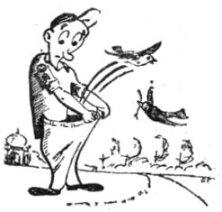
|
Bird in the Pants by an Odd Chance Makes GI Dance
1307 BU, New Delhi, India - It could happen only in India. Sgt. R. A. Migliaccio, navigation and briefing wallah at this base, doesn't have "ants," but he does have birds in his pants!
Yawning and stretching, the sergeant rolled out of bed one recent morning and gave a lusty yell for his bearer to bring him a clean uniform.
So far so good, but soon the trouble began. Sgt. Migliaccio slipped on the trousers and received a sudden and strange sensation. Off came the pants!
A quick investigation revealed that one of the birds of the camp had started building a nest in the seat of the sergeant's pants.
Direct Approach Method Uncovers Strange Truths
1345 BU, Kurmitola, India - This is a story with a moral.
From now on local GIs are going to be much more wary
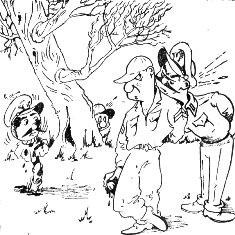 "A penny for your thoughts . . . PRIVATE!"
"A penny for your thoughts . . . PRIVATE!"
|
Running for Subway
During a lull in the proceedings, a trio of GIs espied two very attractive Indian girls, clad in brightly-colored sarees, sitting by themselves in a corner. The GIs wanted to start a conversation but the girls looked so typically Indian, the sociable soldiers were unable to think of a topic that would be of mutual interest.
Failing to think of an ice-breaking sortie, Pfc. Sol Seldman began reminiscing about Brooklyn, declaring nostalgically to his buddies, "I wish I were home now, running for the BMT subway."
"Yes, and probably missing it," said the Indian maid in perfect English.
And the Moral
The three cosmopolites gaped in open-mouthed winder, until Seldman recovered sufficiently to gasp, "What do you know about the BMT subway?"
The girl then went on to detail a short summary of her life history. Her father was an Indian professor studying in Shangri-La. There he met and married the girl's mother. The girl was born and reared in Brooklyn, and her companion, a sister, had been born in Manhattan. Furthermore, these typical Indian girls had only been living in India for five years and were expecting to return to Uncle Sugar soon.
He Proves It Can Be Done; ATC Man Takes Prisoner
1333 BU, Chabua, Assam, India - "It can be done, men," said Pfc. Frank W. Distel, after reading a letter he received from an ATC base in the South Pacific. In black and white the letter tells how an ATC headquarters messenger brought in a Jap prisoner.
The messenger was on duty, delivering correspondence from one end of the enemy-ridden island to the other. He was deeply engrossed in the usual thoughts of a GI - rotation, chow and mail - when he saw a bedraggled, half-starved Jap standing in the path before him.
Expecting fireworks, he was surprised to see the Jap coming toward him, reaching for the moon, seemingly begging to be captured. He escorted the Jap back to camp and saw him put safely behind bars.
Father Goes Home for 45-day Leave as Son Stays Here
1328 BU, Misamari, India - The only father and son combination at this base will come to the parting of the ways shortly as the father, S/Sgt. William A. Goodwin, goes home to Uncle Sugar.
Things are not as dark as they seem for his son, Cpl. Kadzie Goodwin, for the father has requested 45-day leave in preference to regular rotation, so he will be able to return and be with his son.
This team got together last December when Cpl. Kadzie Goodwin arrived here from another ATC base. Mrs. Louise A. Goodwin, of Ithaca, N.Y., is mother and wife of the pair.
Both volunteered in 1942 from Ithaca, father preceding son by only a few months. The similarity doesn't stop there, however. Both Goodwins are radio operators, but father William is in the ATC, on flying status, while Kadzie is a ground operator in AACS.
1330's Maintenance Squadron Gets Unit Award for Service
1330 BU, Jorhat, Assam, India - Squadron "C" at this base has been awarded a Meritorious Service Unit placque, it has been announced here.
The award was made, says the citation from the office of Lt. Gen. George, "in recognition of its superior performance of duty and outstanding devotion to the accomplishment of its assigned mission."
The specific occasion of the award was a 28 percent increase in aircraft utility between Oct. 1 and Nov. 30, 1944, due primarily to the efforts of Squadron "C," the aircraft maintenance department of the base.
"Enthusiastic in the execution of orders," the citation concludes, "disregarding long working hours and adverse weather conditions, personnel of Squadron 'C,' in the accomplishment of their mission, exemplify the highest traditions of the military forces."
|
Who Asks Questions, Pilots Want To Know! 1342 BU, Chanyi, China - A pilot from this base reported the following telephone conversation with the weather office at an advanced fighter base where he landed recently. "Hello," the pilot said, "Will you give me the winds aloft?" "Who is calling?" the weatherman asked. "F/O So-and-so." "How long ago did you land?" "About 30 minutes ago." "What did you find the winds aloft?" "Oh, about 260 degrees at 30," said the pilot. "Well thanks very much," said the weatherman and hung up. |
|
1304 Aircraft Are 100% Operational In 24-hour Period 1304 BU, Barrackpore, India - The boys of the engineering and the priorities and traffic section here are holding their heads high these days, even if it means sticking their necks out. They claim two new records during April. During the 24-hour period ending at 7 p.m. on April 18, all assigned aircraft at this unit were 100 percent operational, and averaged 15.8 hours in the air and 1.5 trips. P & T's contribution was getting a ship unloaded, crews changed, new load aboard, and plane in the air again within one hour and 20 minutes. The average time for the operation, with a ship of this type, is more than two and a half hours. |
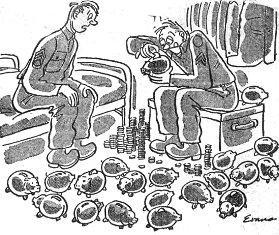 "I think you'll find that the Army savings systems are a lot more convenient."
"I think you'll find that the Army savings systems are a lot more convenient."
|
Homesick GIs Now Can Hear What To Expect
'How To Be Civilian' Program is Radio Feature at 1333
1333 BU, Chabua, Assam, India - All war-weary GIs, Calcutta commandos, and chairborne headquarters men now can learn "How to be a civilian" if they listen to the radio station at this base.
Every Friday, Renshaw University, the base USAFI school, hits the airwaves over station VU2ZV with its orientation program for nostalgic GIs.
Each week "How to be a civilian" salutes a different American college co-operating in the USAFI program. This gesture consists of a dramatization of life at that particular college.
Impromptu sound effects are invented by Sgt. Hugh Griffin. Footsteps crunching through the campus snow are made by shuffling the closed pages of Renshaw University's one dictionary. Making cokes in a campus juke joint is imitated with the help of an aerosol bomb.
Sex appeal on the show is provided by two pseudo co-eds, Eve Kilgus and Winson Wallace, American Red Cross memsahibs.
Chief among the program's unusual features is a one-man "Information Please" service conducted by Sgt. Ashley Hale. He gives helpful hints on the problems and difficulties that will confront a jungle-happy veteran upon return to civilian life. He describes procedures to be followed in boarding a street car and hands out information on other Stateside problems.
1332's Farm Bureau Has Cleared Jungle for Vegetable Plot
1332 BU, Mohanbari, Assam, India - In June or July there will be fresh vegetables for all at this base, if Pfc. Robert K. Carter's plans meet with success.
One acre of jungle has been cleared and planted thus far. Turnips, radishes, sweet potatoes and carrots are among the crop. Lettuce and cucumbers are being added, as well as cantaloupe and watermelon, if the seed arrives in time from Carter's own Georgia farm.
This crop, with the possible addition of a few Indian monsoon vegetables, will be the extent of the local farm bureau's activities until the monsoon weather is ended. Next fall six acres will be cleared and planted.
A farm the latter size, according to Carter, will supply ample fresh vegetables for all the men of this base.
No Warrant Officers Will Be Made Here
Hq., Calcutta - GIs who have had their hearts set on becoming warrant officers might as well forget their aspirations, according to information received from the personnel section.
A-1 was notified by Washington that no appointments as warrant officer, junior grade, may be made, because of an over-all overage of W/O's in the Air Forces. The directive adds:
"All recommendations pending in this headquarters at the present time will be returned under separate cover. At such time as appointments can again be made, all base units will be notified. It is not anticipated by this headquarters, however, that the present situation will change in the near future."
Skymasters Busy Shattering Records
1346 BU, Tezgaon, India - For the third time in five days, C-54s of this base shattered their own records last week when 49 ships crossed the Hump.
On April 21, 42 trips were made, on the 23rd, 47, and on the 25th, the present mark of 49 was posted. Seventeen of the huge Skymasters made two trips to China on the latter date, carrying more than 655,000 pounds of supplies.
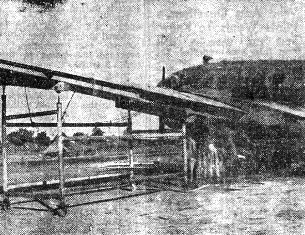 This dolly, which has cut the wing removal time in half at 1332 is a refinement of the gadget created by M/Sgt.
John D. Smith.
This dolly, which has cut the wing removal time in half at 1332 is a refinement of the gadget created by M/Sgt.
John D. Smith.
|
Ingenuity Prevails As Sgt. Constructs Wooden Wing Dolly
1332 BU, Mohanbari, Assam, India - M/Sgt. John D. Smith, of Mobridge, S.D., has solved a knotty problem confronting maintenance crews here by his invention of a dolly constructed entirely of wood.
With an increase in the number of aircraft on the base, and with no increase in personnel accompanying it, the manpower situation at the line maintenance shops was getting pretty tight. There was some doubt whether the boys could keep abreast of the current wing replacements unless a miracle happened.
Smith didn't wait for the miracle but went ahead and dreamed up his invention.
In order to adjust the dolly to the wing it was necessary to put a jack under the legs. This resulted in a ticklish job when the dolly was lowered to its wheels. But, crude as it was, the dolly cut wing removal time from 24 to 12 hours.
Improvements were made by Capt. Roy W. Gedeborg, and the present dolly evolved - a solid affair of four inch pipe, welded. The wing supports are six-by-ten beams shaped to fit the wing and padded with three-inch felt. At all four support points the frame is equipped with screws obviating the use of jacks to adjust the dolly to the wing.
Average time for wing-tank changes is now less than eight hours, and the hazard of a broken or slipping sling is entirely removed.
Hungry GI Goes Snipe Hunting in Deserted Spot of Assam, But His Luck Doesn't Hold Up
Given Admonition for Hunting Out of Season by Officer
1328 BU, Misamari, Assam, India - Pfc. Willis Searing is known for his liking for food. His mouth watered as he sat contemplating the gustatory delights of an Assam snipe fry.
He was a grotesque figure there in the Assam moonlight, waiting in a deserted spot for the unsuspecting snipes to enter his bag.
Awkwardly holding the mouth of the bag open with one hand, he corrected the angle of his flashlight to conform with T/Sgt. Hal Fisher's directions. Willis smiles wryly as he remembered how he had to beg Fisher, Sgt. Major Phillips, Cpl. E. Young, and Pfc. Ozzie Walpole to take him on their snipe hunt.
Not A Nibble
Fisher said they had caught nine luscious snipes in less than an hour the last time out. Young said ten.
Willis' mouth began to water again. He waited.
After a time he realized that he wasn't even getting one. Disgusted, he started back to the area. The snipes just weren't biting tonight. Too bad. He was sure hungry.
Heavy Fine
Suddenly a figure loomed up out of the darkness. It was an officer, an angry officer. The officer accosted Willis and told him he was under arrest for hunting snipes out of season.
Dismayed, Willis protested, "But I didn't catch any, sir!"
The officer relented and let him off with an admonition, making it plain that the fine for sniping out of season was heavy.
Fisher, Phillips, Young and Walpole were in hysterics when the weary, bedraggled snipe hunter returned.
U.S.S. John Blish Named for Father of 1327 Corporal
1327 BU, Tezpur, Assam, India - Cpl. John Blish is as proud of a small survey craft in the U.S. Navy as he could be of any battleship. The reason is that the vessel, the U.S.S. Blish, is named after his father, the late commander John Blish.
Cpl. Blish received a photostatic copy of a letter sent by the Navy Department to his mother, Mrs. John Blish, in Washington, D.C. The letter stated that the vessel had been converted into a surveying ship and commissioned in February, 1944.
Commander Blish had been a professor of mathematics at the U.S. Naval Academy at Annapolis before the first world war. While there, he made an important contribution to the Allied war effort when he invented a machine gun later developed as the Thompson sub-machine gun. Enlisting the aid of Thompson, who adapted the weapon to military needs, and of Thomas Fortune Ryan, Sr., one of America's wealthiest financiers. Blish formed a company to manufacture them for the Army.
Stafford To Operate Hobby Shop at 1328
1328 BU, Misamari, Assam, India - Cpl. frank Stafford, a hobbyist in civilian life, has been selected to operate the hobby shop that will open here in a few weeks.
Aided by Sgt. Bob Thumm, who did the carpentry, Stafford has rigged up a nice shop in the small thatched building that will be the Mecca of the base hobbyist.
The mosquito-proof structure has been divided into two main parts. The front part houses a desk, supplies and a display cabinet and the work tables are in the other section.
Eyes Tear-Filled As Pfc. Witnesses Destruction of Cap
1333 BU, Chabua, Assam, India - Enraged at unfavorable comments regarding a specially designed flight cap, Pfc. Mickey Solomon, Allentown, Pa., owner of the cap, decided to destroy it and put an end to all the ribbing he was taking.
Outside his tent, he put a match to the ill-fated cap and stood over it as it burst into flames. His tentmates came out to witness the burning and saw Solomon actually sobbing with real tears flowing from his eyes. To them it seemed ridiculous that a grown man could become so mournful over a misfitting hat.
Sympathetic feelings ended however, when Solomon explained, "I wore this when I went through the gas chamber a couple of weeks ago. I guess the tear gas fumes are still in the material."
At that point the other men found their own eyes watering.
'Listening Skies' Compared with 'Green Pastures'
Benny Meroff, Entertainer, Says ICD Negro Show One of Best
1333 BU, Chabua, Assam, India - Turning the tables in the way of entertainment, stars of Benny Meroff's "Funzafire" became the audience at a dress rehearsal of "The Listening Skies," original Negro pageant of music being produced here.
The previous evening, the "Listening Skies" cast saw "Funzafire" at the Polo Grounds, and after the show the members invited the professional entertainers to see their performance the following afternoon. Benny Meroff, Kathleen McLauhlin, dancer, and Charlie Marino, midget comedian, watched a two-hour program presented especially for them.
After the program, Benny joined the associate directors of the GI show, Pfcs. Charles Etcherson, and S. Earl Wolfe, in a discussion of showmanship and stage techniques.
With the premier of the show which includes a cast of 50, not far off, the professional tips offered by Meroff were incorporated into the show, which promises to be one of the most successful ever presented in these parts. Capt. Sam A. Scalici, squadron commander, was pleased to hear Benny Meroff's praise. Benny said "The Listening Skies" will rate with such great Negro shows as "Green Pastures" and "Porgy and Bess."
Liven Up Basha As Info Center For 1346th GIs
Completely Renovate Building for Handsome Library, News Room
1346 BU, Tezgaon, India - The new information center and library here are evidence that a building of basha construction can be livable and comfortable. More, they are evidence that it's possible to jack up the roof of a basha and run an entirely new building under it.
 From Warner Bros. via China, comes this picture of Lauren Bacall. She seems very careful lest her ankle show.
From Warner Bros. via China, comes this picture of Lauren Bacall. She seems very careful lest her ankle show.
|
The prevailing idea for the interior decoration of a basha is to cover as much of the bare architecture as possible with any available material. The bamboo walls were covered with burlap and whitewashed. A ceiling of the same material covered the ugly and irregular roof.
Map-Case Dominates
Around the braces, traditionally set in at a 70-degree angle to the floor, eccentric designs were cut out of plywood and mounted, providing space for exhibits and also covering the leaning uprights. Windows were cased with bamboo and salvaged mosquito nets were used for screens. A screen door was fashioned from a few supercharger crates and more mosquito nets.
At the entrance of the remodeled basha is a show window which gives the visitor an idea of what is offered inside. In the information center a huge circular map case dominates the room. Constructed from salvaged telephone wire reels and plexiglass, it forms a backing for maps of the various fighting fronts.
On the left wall is posted material pertaining to information. Pamphlets on the "GI Bill of Rights" and
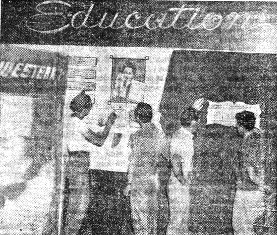 If you look hard you can see that this is a basha, but it looks about as much like a public building of Western
construction as any basha yet built. It's the information center and library at 1346 in a new basha run in under
the roof of an old one.
If you look hard you can see that this is a basha, but it looks about as much like a public building of Western
construction as any basha yet built. It's the information center and library at 1346 in a new basha run in under
the roof of an old one.
|
Group Study
On the right wall, the Armed Forces Institute gets the play, with text books and application blanks displayed appropriately. Questions concerning the Institute which formerly had to be answered personally now can be answered by reading the advertisement.
A room for group study classes is situated in the rear of the building, with facilities for the instruction of 25 men. Tables and chairs and suitable visual education aids are available. When classes are not is session, the room can be used as a reading or writing room.
The library is located on the porch, which is screened in. During the first month of operation over 400 books were checked out.
Indian librarians are employed on two shifts. The library is open from 8 a.m. to 11:30 p.m.
Request Lock from Assam, Get Lengthy Indorsement
1348 BU, Myitkyina, Burma - A certain officer here henceforth will think twice before signing papers without carefully reading them beforehand.
Recently he signed a requisition for a lock, which his erring clerk had addressed to the utility officer of an Assam base rather than of this base. The requisition was returned from Assam with a note saying a mistake had been made.
The front office here, deciding to teach the officer a lesson, placed a first indorsement on the requisition, pretending that it had come from the Assam base. The indorsement read as follows:
1. It is suggested your local S & S officer be contacted for this item. If he cannot procure it a certificate of non-availability is requested, with specification of the type of lock desired.
2. It is further requested that in the event we are to furnish this item, information as to the mode of transportation desired be forwarded immediately. Also we request to know who is to be designated as the using agency.
Offers Wide Choice
3. In the event you are unable to obtain a priority for air shipment, what other means of transportation do you recommend?
a. By rail to Calcutta, and thence by boat to Rangoon? Inasmuch as Rangoon is now controlled by the Japanese, it is felt delivery will be somewhat delayed.
b. By native courier direct to your station? It must be realized this would necessitate the procurement of guides, pack bearers, supplies for approximately 14 days, and approximately three pairs of shoes each, which would no doubt be worn out on the hike over the first ridge.
c. By kayak from this station to Ledo, thence by the Ledo Road? This mode of transportation would depend upon availability of Eskimos, and is not recommended because all Eskimos still live in Alaska.
d. By dog sled? The weather man has been consulted and does not recommend travel by snow, as there is no snow.
By Carrier Pigeon?
e. By jeep-railway? This would require co-ordination through theater headquarters, as to the availability of engineering battalions, and for the appropriation of funds.
f. Bay carrier pigeon? As a last resort this method is tentatively suggested. The exact weight of the desired item will be necessary so that our weight and balance officer can prepare the manifest correctly and will not overload the pigeon, or make him nose-heavy or tail-heavy.
4. Your recommendation as to further necessary measures will be gratefully received.
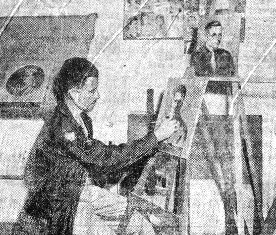 T/Sgt. Arden Claude Steele is shown at work on his forthcoming self-portrait, latest is a series of oils created
in his spare time. On the higher easel hangs his portrait of Lt. Billy O. Phillips, base special service
officer, while on the table at left is Pfc. Claus L. Sapp. In the background are photographs of other portraits.
T/Sgt. Arden Claude Steele is shown at work on his forthcoming self-portrait, latest is a series of oils created
in his spare time. On the higher easel hangs his portrait of Lt. Billy O. Phillips, base special service
officer, while on the table at left is Pfc. Claus L. Sapp. In the background are photographs of other portraits.
|
Artist Has Own Paint Shop
To Continue His Profession
1330 BU, Jorhat, Assam, India - With intensive war activity swirling about the door of his shop, T/Sgt. Arden C. Steele, Kingston, Pa., quietly pursues his profession of portraiture.
In 1933 Steele began painting as a hobby but soon chose it as his profession. He worked in a sign shop, did some commercial art for a local newspaper, then decided to take up portrait-painting, which he expects to do exclusively after the war.
At first he had little hope of exercising his talent while in the Army, but happily for him he was placed in the sign painting section and is now in charge of his own shop.
One result is that the signs on the base are a far cry from the routine stenciling work usually done, and reflect the ability of the real artist who is producing them.
he has converted his shop into a studio - lacking, of course, the northern light of his studio at home, and short of other conveniences, but adequate. here, after hours and when routine business is slack, he spends many hours doing portraits of personnel stationed at the base.
One of the first thing he's going to do when he gets home, says Steele, is a portrait of his wife and their brand new daughter. Sgt. Steele works in oils, water colors, charcoal, tempera or pastels, but his favorite medium is oils.

For every soldier overseas there is a woman who waits at home. Each one dreams of the day when her man will come back. Mostly they dream at night; their days are filled with work.
Women of America have been waiting a long time in this war. Yet while they have been waiting, they have not been idle. The full-scale operations of mighty war plants, offices, on down to the corner gas station, would have been impossible if it not had been for the women on the homefront who marched into battle, side by side with their loved ones.
Through all these years, all these tasks, women have been coming home each night to empty houses, to wait . . . and hope. They deserve our highest tribute; they already have our deepest love.
Above all, to those women who have waited in vain, and to those who will wait in vain, goes the devotion of a nation. That they, in their saddest hours, could take up tasks to carry on from where their men left off, is certainly bravery beyond the call of duty. Truly, they know the cost of all-out war.
Their eyes are seeing a thousand lonely nights but their dedicated hands are supplying a thousand needed items. Their spirit is unquenchable . . . their inspiration immortal.

The hazards encountered by all pilots in Hump operations and their heroic efforts can be by no means be overrated. It is felt, however, that your article on page 1 (Hump Express, Apr. 26) "First Hump Hop of ETO Veteran was Close One" does not belong in the category of heroic achievement.
The pilot of the C-109 was by no means a hero; he was a lucky fool. He does not warrant the respect of the other crew members. The pilot was charged with the responsibility of returning a valuable gasoline tanker (C-109) and a valuable crew on a return trip over the Hump. This pilot not only jeopardized his own life but those of his crew by throwing away one of the cardinal rules of instrument flying when he let down without first establishing his exact position and altimeter setting.
The pilot had assumed that he was in a valley in the close proximity of 1347 BU and just elected to let down. Only by the greatest luck did this crew land alive. The pilot just skimmed the top of a mountain, seriously damaging the No. 1 engine of the aircraft. There was no noble effort here. There was a hair-raising experience but there were no heroics. The pilot returned alive owing only to the grace of God.
There are many pilots daily who fly the "rockpile" in accordance with the regulations, who encounter adverse condition beyond the wildest imagination of the ordinary pilot. For this the Army Air Forces, in recognition, awards Air Medals and Distinguished Flying Crosses that are well earned.
These men we cannot commend too highly but we denounce from every cockpit any pilot who jeopardizes his crew and valuable equipment by not observing the cardinal rules of caution. -- Major John J. Murdock, Jr., Air Corps., Division Flying Safety Officer

ELEGIE OVER A BOTTLE I'm sticking to water, don't even want tea, For there's nothing so tasty and nothing so nice. The night after revels might bother some guys, But I've learned my lesson and, brother I'm wise. Keep your Fighter Brand whiskey and liquor that's red - What goes in my stomach won't go to my head. I wish the fact published to one and to all, I'm back on the wagon, and I hope I don't fall. - Huff in The Mohner |
|
LATE SECTION VIII - If you're bucking for a Section VIII, stop. Old Section VIII is
no more.
Section VIII of AR 615, which disposed of various causes for dismissal from the service, always got more attention than other sections of 615, for some reason (probably human-interest reasons). The components of 615 are broken down now, and broken-down old VIII, relieved of duty, reappears as new, clean, fresh AR 615-368. If you want to buck for a 368, why go right ahead. Good luck! Like Section VIII, TD is a thing of the past. You can now get (see AR 850-150, 18 September 1944) TDY, if you want temporary duty. TD now means "tank destroyer," which may prove less popular. ATC Regulation 35-13, 30 January 1945, however, goes right on talking about TD, in referring to temporary duty, and probably so will a lot of other people for some time to come. |
People In U.S. Know War Too, Reports Writer
Many People on Homefront Feel War Losses Deeply
Editor's note: The following article was written for Hump Express by Harold Isaacs, Newsweek
correspondent, upon his return to the U.S. after covering the war fronts in the Far East.
By Harold Isaacs
Homecoming is mostly a pretty private affair. You come back to the much loved and the familiar, and you leave behind you the gnawing loneliness of distance and separation.
You can recapture a little of what the war takes away from everyone - the sense that there can be a little normality and a little sanity in living. You find it in the blurred and incredible instant of reunion with those you love, or walking down a familiar street, or finding yourself again an obscure digit in a great mass of your similars and shedding the lonely isolation of being conspicuously strange in a strange land.
Coming back, particularly from China, Burma and India, there is of course the overpowering impact of the wellbeing of America.
Haven't Felt War?
But it is so easy to be deceived by this wellbeing, hopelessly and myopically deceived. I write as a war correspondent, which means I am non-soldier and non-civilian, non-fish and non-fowl, non-hare, non-hound.
At any rate, I assume the right to challenge the curious notion acquired by many returning soldiers that because people back home don't live in foxholes and eat C rations, they don't know what war means. It is a kind of vain-glorious hairshirt philosophy that a man adopts because people back home have not shared horrors of combat, the loneliness of distance, the lack of privacy, the stupidities of Army life.
Unshakeable Solidarity
It is also true that American workers have a way of standing up firmly for their rights and when they do so they are holding a crucial front for millions of workers in uniform. Those who too lightly condemn these workers forget that they too have sons and brothers and husbands and sweethearts overseas with whom they share the insecurity of the future. Certainly the fantastic war production of American industry does not suggest that strikes have affected the output anywhere near as much as they might have. It seems to be pretty easy to fall for propaganda and attitude that drive a critical wedge between civilian and soldier when their obvious common interest in the whole future really underlines how necessary and vital it is for them to join in an unshakeable solidarity.
But beyond this it is superficial and false to think that people back home do not share the horrors of war and the loneliness of separation. The casualty lists of Americans now run close to a million. That means anywhere from five to ten million Americans who mourn an irretrievable loss or injury, a loved one who is dead or maimed. You try to tell that to any one of the many million other who wait in lonely anguish for the word they hope will never come but with constant fear that it might come any hour.
CBI No Picnic
The shadow of loss follows you everywhere even into your own office where a man sits irrevocable stripped and hardened by the loss of a son. It follows you through the columns of the newspapers where amis all the claptrap of wartime, news the sober columns of the casualties stare at you in their tiny print, each line a man. Who will wear lightly the mantle of superiority over people at home taking these losses, suffering these fears, somehow abiding this loneliness?
Americans in CBI have less reason than most to fall for the phony hairshirt attitude toward the folks back home. Surely "CBIs" have no picnic, and the dead are just as dead in the small battles as in the big, and the maimed no less maimed, and loneliness is the same silent horror wherever it is suffered. But coming back from CBI one feels that the immense private joys of one's own homecoming have to be tempered by a sobering humility. The war is lousy in China and Burma and India, whatever place a man is stuck in. It's lousy back here too.

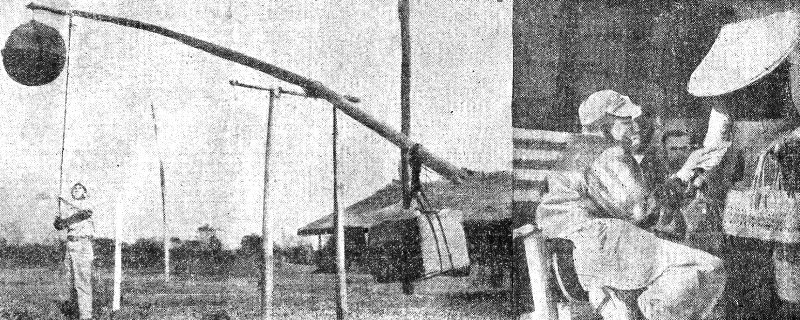 Left, the "Big Red Ball" at 1333 tells when an air raid alert has sounded. Cpl. Charles E. Winkenwerder, Salem, Ore.,
billeting clerk in the transit office, demonstrates the use of the gadget, which operates on the principle of the
old-time well-bucket sweep. When the rock is untied from a peg in the ground the rock's weight at once sends the red
ball straight up. At right, 1338's Cpl. F. P. Gabel, Philadelphia, buys a tangerine from "Tangerine Tillie," China's
Apple Annie.
Left, the "Big Red Ball" at 1333 tells when an air raid alert has sounded. Cpl. Charles E. Winkenwerder, Salem, Ore.,
billeting clerk in the transit office, demonstrates the use of the gadget, which operates on the principle of the
old-time well-bucket sweep. When the rock is untied from a peg in the ground the rock's weight at once sends the red
ball straight up. At right, 1338's Cpl. F. P. Gabel, Philadelphia, buys a tangerine from "Tangerine Tillie," China's
Apple Annie.
|
 (1) With Pfc. Robert Hermann, Melrose, Mass. (right) lending argumentative support, T/Sgt. Cliff Bennett, Kenosha, Wis.,
tries the old Army game in a curio shop near 1347, Shamshernagar, India. (The only trouble is that India thought of the
game before the Army did.) (2) Indian workers lose no time getting to work on a plane which has just arrived from China,
with special attention to shining up the AAF and ATC insignia. (3) A New Haven soldier, Pfc. Fred H. Finkel, draws up
plans for a new building at his base, with his Indian assistant. Finkel has been a draftsman in ICD since coming to
India. In civilian life he was a General Motors employee.
(1) With Pfc. Robert Hermann, Melrose, Mass. (right) lending argumentative support, T/Sgt. Cliff Bennett, Kenosha, Wis.,
tries the old Army game in a curio shop near 1347, Shamshernagar, India. (The only trouble is that India thought of the
game before the Army did.) (2) Indian workers lose no time getting to work on a plane which has just arrived from China,
with special attention to shining up the AAF and ATC insignia. (3) A New Haven soldier, Pfc. Fred H. Finkel, draws up
plans for a new building at his base, with his Indian assistant. Finkel has been a draftsman in ICD since coming to
India. In civilian life he was a General Motors employee.
|
 Pets which would seem quite extraordinary at home are perfectly commonplace in India and in Burma, and every military
establishment is certain to abound with them except in cases where medical authorities have banned them. (Monkeys are
perhaps the most frequent, probably outnumbering dogs and cats.) Above at left is Pfc. Joe Bight, of the 1327 BU, Tezpur,
with his pair of parrots. (The two pups also belong to Bright.) His hometown is Paducah, Ky. Center, Pfc. Oscar Paulson,
Valley City, N.D., also of the 1327 BU, dangles a succulent fish before the maw of Oscar the Otter. Oscar like fish
almost as much as soldiers like Spam. At the right, Pvt. Frank Schatzel, of Greensboro, N.C., poses with his pet chicken,
Mabel, at the 1348 BU, Myitkyina, Burma. Mabel, who was caught by Schatzel while she was sitting on eight eggs, has gone
right on producing ever since the capture, and now has virtually licked the egg problem for her owner. He figures that
she keeps up the good work mainly because she suspects that if eggs should fail, there is always the possibility of
fried chicken.
Pets which would seem quite extraordinary at home are perfectly commonplace in India and in Burma, and every military
establishment is certain to abound with them except in cases where medical authorities have banned them. (Monkeys are
perhaps the most frequent, probably outnumbering dogs and cats.) Above at left is Pfc. Joe Bight, of the 1327 BU, Tezpur,
with his pair of parrots. (The two pups also belong to Bright.) His hometown is Paducah, Ky. Center, Pfc. Oscar Paulson,
Valley City, N.D., also of the 1327 BU, dangles a succulent fish before the maw of Oscar the Otter. Oscar like fish
almost as much as soldiers like Spam. At the right, Pvt. Frank Schatzel, of Greensboro, N.C., poses with his pet chicken,
Mabel, at the 1348 BU, Myitkyina, Burma. Mabel, who was caught by Schatzel while she was sitting on eight eggs, has gone
right on producing ever since the capture, and now has virtually licked the egg problem for her owner. He figures that
she keeps up the good work mainly because she suspects that if eggs should fail, there is always the possibility of
fried chicken.
|
Geography of India Played Great Part in Influencing
Soul of Its People Down Through Centuries
Everything in India is Vast Compared with Europe;
One Man in Five in World is Indian;
Nation Called Empire's Jewel
By B. J. Vaswani
The soul of man is powerfully influenced by the soul in which he takes birth and grows. So is it with nations, too. Geography could easily be shown as having contributed greatly to the making of a nation in the various stages of its growth and doctrine.
The present world position of the USA is in no little degree due to her favorable geographical conditions. India's destiny has very largely been shaped in the past by this influence, and its future is in no small measure bound up with it - hence this brief presentation of India's geographical background.
What are the essential features of India's geography?
Varieties of Culture
(1) Firstly, of all the countries in the world, India is the most clearly marked out by nature as a region by itself. Divided by the surrounding countries in the northwest, north and northeast by a natural Siegfried line of the loftiest mountains in the world, and separated from others by wide stretches of ocean, it led for many centuries a sheltered existence which allowed it to evolve a distinct civilization. This has not only put a stamp of fundamental oneness on Indian life in spite of its varieties of culture but also made it too strong for invaders to uproot it.
(2) Secondly, lying between great land masses in the northeast and great water masses in the southwest, India gets the full blessings of the monsoons. They not only give widespread rain but also feed its great rivers all the year 'round. India is therefore, and has been for ages past, a granary of the East and a world emporium for many products useful to man.
Global Position
(3) Its variety of climates, soils and vegetation is another remarkable feature in the geographical makeup of India, which along with its underground treasures, makes it one of those fortunate countries potentially among the richest in the world. It's no wonder an American geographer once described India as the country in which both nature and man are engaged in mass production.
(4) India's global position is one which any nation may envy. It is usual for some people to draw the map of the world in such a way as to put Great Britain in the center. But India could more rationally be so placed. It lies midway between the Near East and the far East.
It is midway between Africa and Australia, and to all these countries it has easy access by sea. With her resources properly exploited, India could be the hub-center of industry and commerce again as it was for thousands of years until the 18th century.
Population of 400,000,000
(5) Everything in India is on a stupendous scale, compared with the countries of Europe. If the Himalayas were placed on the continent of Europe, they would stretch from Calais to the Black Sea. India has 40 peaks higher than the highest in Europe and glaciers four times as long.
The rivers of Europe would be almost like some of the irrigation canals in India, which has a population of 400,000,000 - one man of every five in the world. India stretches for 2,000 miles east to west, and 2,000 miles north to south. Its coastline is over 5,000 miles. Its great plain (the Indo-gangetic plain) is 2,000 miles long and 200 miles broad.
(6) Some of the geographical features have very markedly affected the people of India. There is first of all the idea of unity in spite of diversity - the idea of one nationality in the midst of sectional loyalties. India having been a land of abundant production for countless centuries the people have developed one outstanding characteristic which is found nowhere else in the world in the same degree, and that is "contentment."
Man wants but little here below. That is the attitude of most men. Wanting but little, they have often spent their leisure time not in hustling to get more, but in evolving those religions and philosophies which have been among the greatest contributions to world civilization and world culture. The ideal of peace and non-aggression practiced for centuries in India, makes India, as Sumner Welles has recently said, an ideal place for working out the modern programs of world security and peace.
False Rumors On War's End Spread Rapidly
Many Premature Celebrations Started Over False Reports
Hq., Calcutta - Untimely reports of German surrender here Sunday night precipitated a premature celebration of V-E Day.
First announcement of the reported "surrender" was made in the Officers' Club. The statement said, simply, that "Germany has capitulated." The report spread like buckshot.
Someone announced in the Red Cross Club that "It has just been announced in the Officers' Club that Germany has surrendered." In a few minutes rumors had traveled around the base and GIs and officers were believing all manner of reports - including the surrender of Germany and the cessation of all hostilities on European fronts.
Within five minutes after the first erroneous report, scores of men gathered around radios in the headquarters building and dozens of others rushed to the tents and other quarters to await the expected radio report which never came.
Shortly, someone checked with the message center and learned that the basis for the expanding reports was an announcement from the San Francisco conference that Himmler, some time before, had offered unconditional surrender to Great Britain and the United States, but that it had been rejected because it did not include Russia. The facts, however, failed to put much of a damper upon the jubilation which prevailed far into the night.
The base still was buzzing Monday with assertions that the end could not be far off and opinions that the next few days would bring the bonafide reports for which everyone had been waiting.
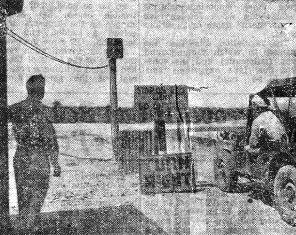 1330 BU, Jorhat, Assam, India - Lt. Edward L. Lenihan's contribution to the base safety program is a stop-and-go
signal controlling vehicular cross-runway traffic. Those who have ignored it have been halted by a shrill whistle,
and one man when so stopped suggested that it was an argument for rotation: "I haven't seen one of those for so long I
forgot what they look like."
1330 BU, Jorhat, Assam, India - Lt. Edward L. Lenihan's contribution to the base safety program is a stop-and-go
signal controlling vehicular cross-runway traffic. Those who have ignored it have been halted by a shrill whistle,
and one man when so stopped suggested that it was an argument for rotation: "I haven't seen one of those for so long I
forgot what they look like."
|
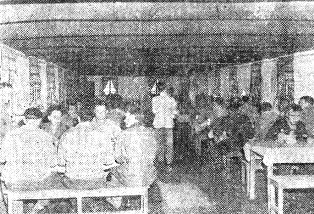 The mess hall at 1339, China, is the most popular place on the post. Stainless Steel serving trays, tablecloths
and upholstered ceiling give the room a Stateside air.
The mess hall at 1339, China, is the most popular place on the post. Stainless Steel serving trays, tablecloths
and upholstered ceiling give the room a Stateside air.
|
1339 Mess is Not Such a Mess Since Improvements Made
1339 BU, Chengkung, China - When one walks into the new mess hall on this base he sees bright colored curtains and blue and white walls. Main feature of the new mess is the ceiling which is made of discarded camouflage nets.
Light blue tables and cloths, stainless steel serving tables, and white-jacketed mess boys make the mess almost Stateside.
There is no more flat water since a new purification unit has been installed. This relieves mess personnel of the troublesome job of boiling drinking water. Newly constructed sinks and sterilizing units help to make their job easier.
Arriving Pilots Given Training in Hump School
Four Distinct Training Phases Include Pre-Flight, Transition
1330 BU, Jorhat, Assam, India - Pilots fresh from the States are getting a comprehensive program of orientation and training at this station's Hump school.
The program is divided into four distinct phases. The first consists of pre-flight training, including aircraft familiarization, high altitude flying, oxygen, radio and communications procedures, and pilot responsibility. In the second phase, Link-trainer instruction is followed by at least seven hours flying time.
Screening Test
In phase three, transition requires eight to 16 hours flying with a minimum of eight hours at night, engine failure procedure, and takeoff and landing technique. The final phase, "en route training," consists of a minimum of eight co-pilot trips over the Hump, followed by two final checks.
Since the newly arrived pilots of course vary in ability and experience, they are subjected to a written screening test to determine exact training each needs for Hump duty.
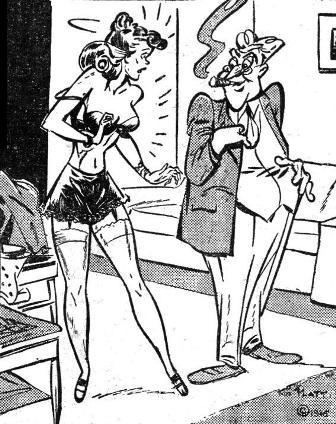 "Didn't I tell you? I'm waiting for the doctor, too?"
"Didn't I tell you? I'm waiting for the doctor, too?"
|
The training is under the direction of Capt. Ralph Miner, assisted by Lt. Joseph Oppenheimer, engineering training officer, and Lt. Clovis C. V. Caillez, I & S officer.
Intelligence Briefing
Engineering training in the course embraces familiarization with carburetion, fuel, electrical and hydraulic systems, instrument operation, and inspection procedure. Operation under emergency conditions are emphasized.
Briefing consists of information security and jungle survival in case of forced landings or bailouts. General orientation in terrain and inhabitants of the Hump region, taboos to be observed, establishment of air contact, walkout procedure, and jungle subsidence are included. Full explanation of the purpose and operation of the 1352 BU, the search and rescue squadron, are included.
Qualified instructors lecture and demonstrate during the classroom phases of the training.
Though the final test of a pilot's proficiency is his performance in flight, written tests must be completed satisfactorily at the end of each phase.
Goes to See GI Movie - Sees His Mother In It
1332 BU, Mohanbari, Assam, India - Shortly after arriving here, Pfc. Frank Dochniak was sitting watching the local cinema when suddenly he pointed at the screen. Slapping a fellow GI on the back, he shouted, "That's my Mom!" During the showing of a short which depicted people urging others to write letters to men in the service, Dochniak suddenly got a funny feeling and finally realized he was looking at his mother. The projectionist ran several private showings for Dochniak.
HUMP EXPRESS is the official newspaper of the India-China Division, Air Transport Command, APO 192, c/o Postmaster, New York, N.Y., and is published by its Public Relations office. Camp Newspaper Service and Army Newspaper Service features are used, reproduction of which is prohibited without permission of CNS and ANS, 205 East 42nd St., New York, 17, N.Y. Other material is submitted by staff members, ICD-ATC base Public Relations sections and other soldier correspondents. Printed weekly by the Hindusthan Standard, 3 Burman St., Calcutta, India, and distributed each Thursday. Passed by U.S. Press Censor for mailing.
| Military transport schedules over India for cargo, personnel and mail . . . maximum tonnage of essential war materials over the Hump . . . movement of troops and supplies in support of tactical operations in China . . . evacuation of the sick and wounded - these are the missions of ICD-ATC. |

MAY 3, 1945
Original issue of HUMP EXPRESS shared by CBI veteran Steven C. King, author of Flying the Hump to China.
|
A better quality image of the photo of Lauren Bacall was used in this recreation. |
Copyright © 2006 Carl Warren Weidenburner
TOP OF PAGE PRINT THIS PAGE ABOUT THIS PAGE E-MAIL YOUR COMMENTS
PREVIOUS ISSUE HUMP EXPRESS BASE NEXT ISSUE
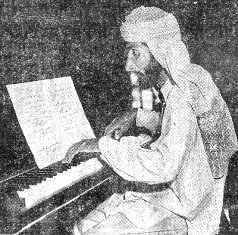 1306 BU, Karachi - Ali Marandah, chief sweeper at the base EM club, gets by with "I'll Get By." Ali recently
decided he had endured too long the efforts of GIs at the ivories (a sentiment many GIs will appreciate) and seized
the opportunity to leap upon the stool and give out with his own interpretation of the old ballad, which included
many variations Tin Pan Alley never dreamed of. Though he had his moment, Ali is now working again at his proper
MOS - sweeper, chief.
1306 BU, Karachi - Ali Marandah, chief sweeper at the base EM club, gets by with "I'll Get By." Ali recently
decided he had endured too long the efforts of GIs at the ivories (a sentiment many GIs will appreciate) and seized
the opportunity to leap upon the stool and give out with his own interpretation of the old ballad, which included
many variations Tin Pan Alley never dreamed of. Though he had his moment, Ali is now working again at his proper
MOS - sweeper, chief.